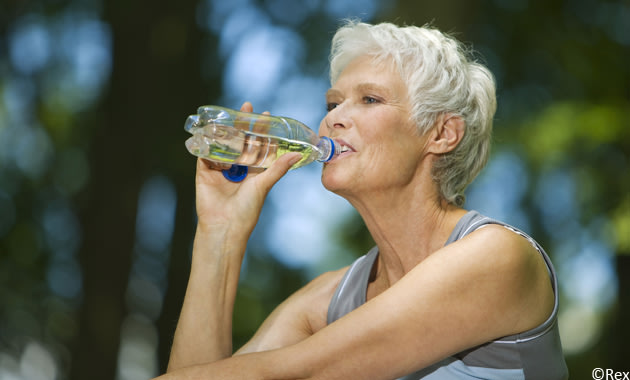
Drinking a litre of mineral water every day
can prevent cognitive decline in Alzheimer's sufferers by removing aluminum
from their bodies, a new study has found.
British researchers found drinking silicon-rich mineral water
"significantly reduced" the levels of neurotoxin aluminum in the
body, potentially slowing decline in Alzheimer's patients. Aluminum has long
been linked to the development of Alzheimer's but no scientific relationship
has yet been proved.
Patients who took part in the new study drank a litre of mineral water
every day for 13 weeks - and the majority showed no further signs of cognitive
decline. One patient saw the amount of aluminum in their body drop by 70 per
cent and three participants actually showed an improvement in their mental
health.
Professor Christopher Exley, of Keele University, who led the research,
said the "surprising" results gave hope to findings ways to combat
the devastating disease. He said: "There were two parts to our research.
The first is that drinking silicon water does remove aluminum from the body.
"When you drink silicon-rich mineral water aluminum throughout the
body is gathered up into the blood and then excreted through the urine. "It
seems to purge the aluminum from the body. We now know we can use this
silicon-rich 'therapy' water to reduce aluminum.
"The second part of our research was looking at the cognitive
abilities of people with Alzheimer's and whether these changed as the aluminum
was reduced. "The most interesting thing was that we did see this
potential relationship between the removal of aluminum and the positive
improvement in cognitive function. "It is highly unlikely to see changes
over such a short period of time so the fact we saw changes in cognitive
ability was quite a surprise. "We saw improvement in some cases, cognitive
function remained the same in others and it did decrease in others."
Previous studies have linked the presence of aluminum with plaques and
tangles - two kinds of microscopic damage - in the brains of people with
Alzheimer's disease. Researchers examined the aluminum levels of 15 sufferers
and their careers or partners - 15 women and 15 men in total. The brand of
water used in the study - published in the Journal of Alzheimer's Disease - was
Malaysian water called 'Spritzer', which has high levels of the chemical
element silicon.
Brands on sale in Britain with similar levels include Volvic and Fiji
water. Scientists asked the participants to drink a litre of Spritzer water
every day for 13 weeks and measured their aluminum levels at the end. The
patients saw a huge reduction in their aluminum levels, with a number showing
drops of 50, 60 and 70 per cent.
Participants were also assessed using the ADAS-Cog (Alzheimer Disease
Assessment Scale-Cognitive) method, which is a recognised 11-part test. The
tests include memory questions and 'simple' tasks such as drawing a clock face
- people with a deteriorating function may struggle to put the numbers in the
right place.
After 13 weeks, cognitive function is eight of the 15 Alzheimer's
sufferers had not deteriorated - and actually improved
"substantially" in three. Professor Exley added: "We now want to
carry out further research to see if we could reduce the risk of Alzheimer's
who seem to be predisposed to it.
"They are usually aged between 40 and 60. If we could get people to
include silicon-rich water in their diet in the future and reduce their risk,
it would be a great." The Spritzer mineral water contain 35mg of silicon
per litre.
However, Professor Exley says waters sold - and easily available - in
Britain also contain high levels of silicon. He said: "Volvic has high
levels of silicon, around 20mg/litre. Fiji water has approximately 45mg/litre. "There
is a simple equation you can do to work out the silicon levels in water. If you
look at the back of the bottle, it will often state a mg/litre analysis.
"On that list should be 'silica', which is silicon with oxygen. If
you divide that number by two you get the approximate value of silicon in that
water." He added that it is more effective to drink the water over a
shorter period, such as an hour, rather than sipping it all at once, in order
to remove aluminum. "The major challenge is that we don't have an
effective drug for Alzheimer's. This is a real tragedy," Professor Exley
said.
"While we know a huge amount, we don't have an effective drug and I
think anything that shows some promise should stand a chance of being
investigated. "I think this deserves a chance." The research is
published in the Journal of Alzheimer's Disease Volume 33, No. 2.
yahoo Lifestyle
No comments:
Post a Comment